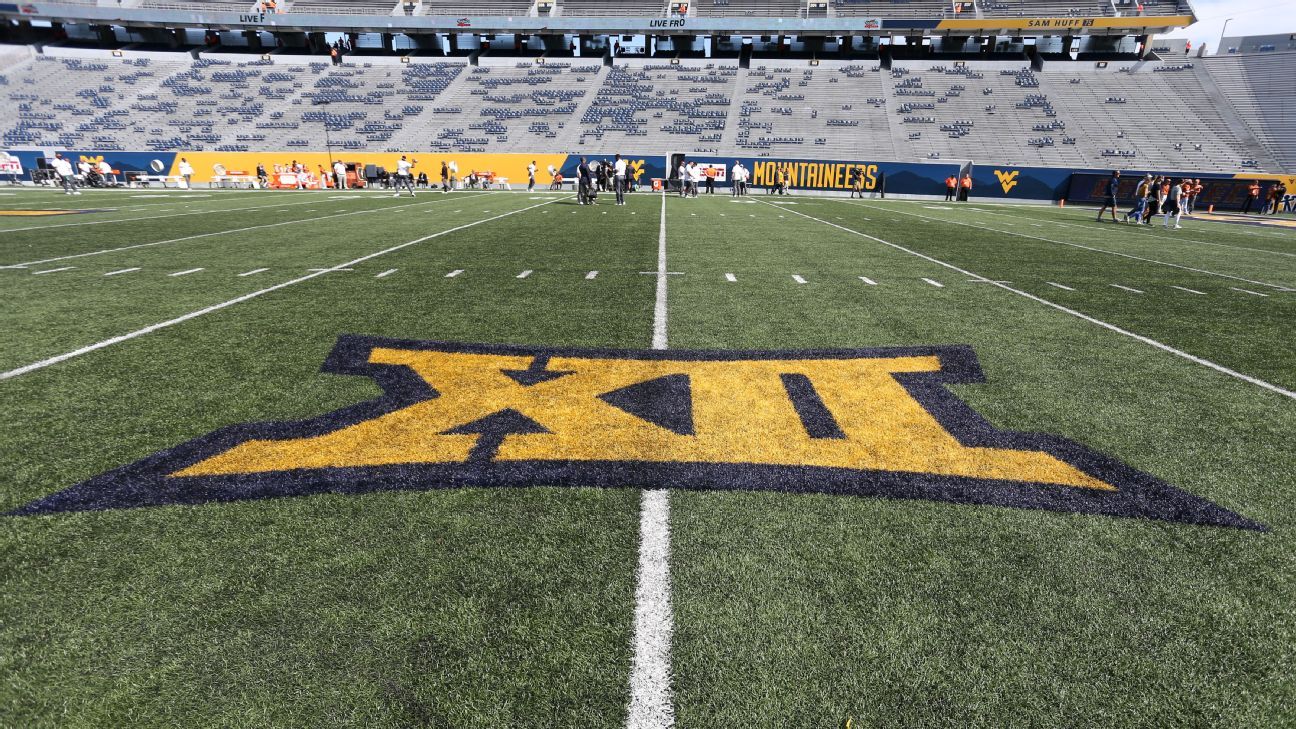
The Big 12 is on the cusp of extending its current television contract with ESPN and Fox, according to ESPN sources.
The league is in the final stages of putting together a six-year, $2.28 billion contract extension that includes a sizable pay bump for schools. The new contract, which takes hold starting in 2025, includes ESPN owning more than 60 percent of the inventory and Fox adding a sizable portion of college basketball.
The contract’s near completion was first reported by the Sports Business Journal.
The deal projects for the Big 12 to make a sharp increase in media revenue per school, despite Oklahoma and Texas not being in the league after the 2024 season. A source said that the league is expected to agree to a grant of rights with its 12 members for the length of the deal.
The overall value of the Big 12’s media deal is expected to increase from $220 million annually to $380 million. That’s an average increase in media-only revenue per school from $22 million to $31.7 million (the $380 million is now divided 12 ways with the addition of BYU, UCF, Cincinnati and Houston).
The new deal will mark an uptick in the Big 12’s overall distribution number, which currently stands at $42.6 million per school. That number is subject to myriad variables such as NCAA tournament units, bowl revenue and new College Football Playoff revenue.
It’s safe to project the overall per-school revenue increasing to nearly $50 million starting in 2025-26. That number could well be much bigger depending on money the 12-team College Football Playoff delivers.
“I think it positions the Big 12 as a continued player in college athletics,” said a Big 12 source. “It makes it a really viable entity and keeps it strongly positioned in college athletics and among the Power 5 conferences.”
Former Big 12 commissioner Bob Bowlsby told Texas lawmakers in August 2021 that the league could take a 50 percent media revenue hit in the wake of the departure of Oklahoma and Texas.
This move to extend with the Big 12’s current television partners is a byproduct of new commissioner Brett Yormark’s aggressive push since arriving in office and declaring the Big 12 “open for business.”
This summer, Yormark creatively maneuvered for the league to engage with the current television partners nearly a year and a half before the exclusive negotiating window was set to open. The league announced its intentions to engage on Aug. 31 and now has the framework of a deal earlier than the Pac-12, despite the Pac-12 being in the open market with its deal expiring at the end of next season.
“With the transition of the two schools out and four schools in, it provides stability for the conference,” said the Big 12 sources. “And it obviously increases revenue.”
The Big 12 chose not to go to the open market, a move that did not expose the league to outside bidders and could have potentially yielded more money for the Big 12 in the long term. But it gives the league security and visibility on traditional platforms.
ESPN’s uptick in investment in the league will give it access to both the most inventory and the league’s top games. According to reporting from the SBJ, ESPN’s so-called “A” package includes the top four football picks each season and 12 of the top 20. That gives Fox a sizable portion of strong inventory among the 26 football games it has each year. According to the SBJ, ESPN gets the Big 12 football championship and the men’s and women’s basketball championships.
Along with a significant investment and commitment to Big 12 football, Fox is adding Big 12 basketball to the package. The Big 12 has been the country’s top men’s basketball conference in recent seasons, with Kansas and Baylor winning the past two national titles and Texas Tech losing the title game in overtime in 2019.
There should continue to be consistent revenue from NCAA tournament units for the league considering the strong recent basketball history of Houston, Cincinnati and BYU.
The near-completion of the deal will shift the focus to the Pac-12, which reports have linked to Amazon as a potential partner. With Fox having access to USC and UCLA games via the Big Ten deal, it had been only loosely linked to the Pac-12. ESPN’s interest level in the league in the wake of this commitment will be closely watched.
The Big 12 deal will expire in 2031, which is one year after the Big Ten’s record-setting deal expires. Notably for the Big 12 moving forward, the contract comes up before the SEC (2034) and ACC (2036) deals expire. This extension will mark the end of what’s known as third-tier rights for the Big 12, in which schools controlled certain game inventory. Instead, those third-tier rights will be distributed to ESPN, which means the schools no longer have to sell them.












